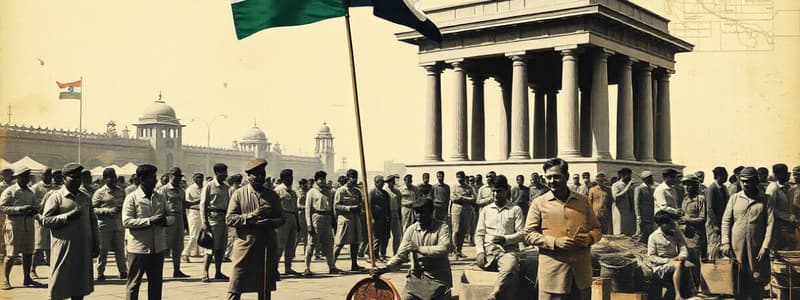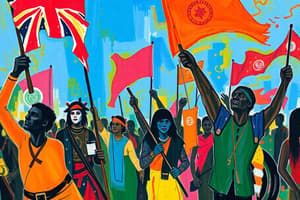Podcast
Questions and Answers
What role did the English language play in India during the time of the Revolt?
What role did the English language play in India during the time of the Revolt?
- It became a source of inspiration and unity. (correct)
- It was primarily a tool for British propaganda.
- It discouraged communication among educated Indians.
- It isolated different linguistic regions.
How did Western education impact the Indian middle class?
How did Western education impact the Indian middle class?
- It led to the creation of a class of loyal British clerks. (correct)
- It discouraged the spread of modern ideas.
- It isolated educated Indians from traditional Indian culture.
- It was only beneficial for higher caste individuals.
What significant change did English language education bring to Indian society?
What significant change did English language education bring to Indian society?
- It enabled the exchange of ideas among different linguistic groups. (correct)
- It limited the spread of rational thinking.
- It decreased the importance of Indian identity.
- It reinforced traditional linguistic barriers.
Who is noted as a prominent figure inspiring future heroes during the Revolt?
Who is noted as a prominent figure inspiring future heroes during the Revolt?
What was a result of the English language serving as a common medium in India?
What was a result of the English language serving as a common medium in India?
What concept did the new education system in India struggle to overcome?
What concept did the new education system in India struggle to overcome?
Which aspect of Western education significantly shifted the perspectives of educated Indians?
Which aspect of Western education significantly shifted the perspectives of educated Indians?
What is one effect of the introduction of the English language on communication among Indians?
What is one effect of the introduction of the English language on communication among Indians?
What was the significant outcome of the Revolt of 1857 in terms of British rule in India?
What was the significant outcome of the Revolt of 1857 in terms of British rule in India?
Which element is NOT associated with the concept of nationalism as described?
Which element is NOT associated with the concept of nationalism as described?
What role did Western education play in Indian nationalism?
What role did Western education play in Indian nationalism?
What was a characteristic of the new class that arose among Indian nationalists?
What was a characteristic of the new class that arose among Indian nationalists?
What aspect of Indian identity contributed to the rise of nationalism?
What aspect of Indian identity contributed to the rise of nationalism?
Which of the following was NOT a cause of the rise of nationalism in India?
Which of the following was NOT a cause of the rise of nationalism in India?
How did the perception of British rule shift among Indians following the Revolt of 1857?
How did the perception of British rule shift among Indians following the Revolt of 1857?
In what way did the leaders of the Indian nationalist movement differ from previous groups?
In what way did the leaders of the Indian nationalist movement differ from previous groups?
Flashcards
Unifying Role of English
Unifying Role of English
The English language played a unifying role in bringing together educated Indians from different regions, fostering a sense of shared identity and national consciousness.
British Motive for Western Education
British Motive for Western Education
The British introduced Western education in India with the intention of creating a class of loyal officials and consumers of British goods.
Influence of Western Education
Influence of Western Education
Western education and the English language became the primary means of communication among educated Indians, transcending regional linguistic barriers.
Nationalism and Western Education
Nationalism and Western Education
Signup and view all the flashcards
Influence of Modern Ideas
Influence of Modern Ideas
Signup and view all the flashcards
English as a Common Language
English as a Common Language
Signup and view all the flashcards
Heroes of the Indian Rebellion
Heroes of the Indian Rebellion
Signup and view all the flashcards
Legends of the Rebellion
Legends of the Rebellion
Signup and view all the flashcards
Nationalism
Nationalism
Signup and view all the flashcards
Revolt of 1857
Revolt of 1857
Signup and view all the flashcards
Impact of 1857 Revolt
Impact of 1857 Revolt
Signup and view all the flashcards
Indian Nationalists
Indian Nationalists
Signup and view all the flashcards
Western Education
Western Education
Signup and view all the flashcards
Organized All-India Movement
Organized All-India Movement
Signup and view all the flashcards
Mobilizing and Uniting the People
Mobilizing and Uniting the People
Signup and view all the flashcards
Break the Bonds of Tradition
Break the Bonds of Tradition
Signup and view all the flashcards
Study Notes
Causes of the Rise of Nationalism
- Nationalism is a feeling of love and loyalty for one's country.
- It is born from shared history, culture, territory, and economic/political goals.
- Several factors were responsible for the rise of nationalism in India.
Impact of the Revolt of 1857
- The Revolt of 1857, though unsuccessful, shook the foundations of British rule.
- It inspired thousands of people and became a turning point.
- Rani Lakshmibai and other heroes became iconic figures.
Western Education and Modern Ideas
- The British introduced Western education to create a loyal class of clerks and buyers.
- Western education opened new ideas such as humanism, nationalism, and democracy.
- It changed the traditional outlook.
- English became a unifying language for educated Indians.
Studying That Suits You
Use AI to generate personalized quizzes and flashcards to suit your learning preferences.




